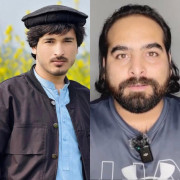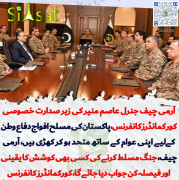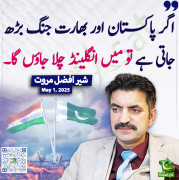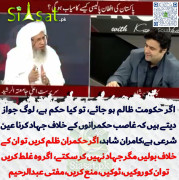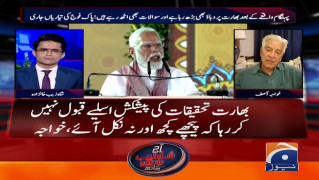hans
Banned
Many mistakenly believe that Islam does not tolerate the existence of other religions present in the world. This article discusses some of the foundations the Prophet Muhammad himself laid in dealing with people of other faiths, with a practical examples from his lifetime.
Freedom of Religious Assembly and Religious Autonomy
Given consent by the constitution, the Jews had the complete freedom to practice their religion. The Jews in Medina at the time of the Prophetpbuh had their own school of learning, named Bait-ul-Midras, where they would recite the Torah, worship and educate themselves.
The Prophet pbuhemphasized in many letters to his emissaries that religious institutions should not be harmed. Here in a letter addressed to his emissary to the religious leaders of Saint Catherine in Mount Sinai who has sought the protection of the Muslims:
This is a message from Muhammad ibn Abdullah, as a covenant to those who adopt Christianity, near and far, we are with them. Verily I, the servants, the helpers, and my followers defend them, because Christians are my citizens; and by God! I hold out against anything that displeases them. No compulsion is to be on them. Neither are their judges to be removed from their jobs nor their monks from their monasteries. No one is to destroy a house of their religion, to damage it, or to carry anything from it to the Muslims houses. Should anyone take any of these, he would spoil Gods covenant and disobey His Prophet. Verily, they are my allies and have my secure charter against all that they hate. No one is to force them to travel or to oblige them to fight. The Muslims are to fight for them. If a female Christian is married to a Muslim, it is not to take place without her approval. She is not to be prevented from visiting her church to pray. Their churches are declared to be protected. They are neither to be prevented from repairing them nor the sacredness of their covenants. No one of the nation (Muslims) is to disobey the covenant till the Last Day (end of the world). ( Ref: Muslim and Non-Muslims, Face-to-Face, Ahmad Sakr. Foundation for Islamic Knowledge, Lombard IL.)
As one can see, this Charter consisted of several clauses covering all important aspects of human rights, including such topics as the protection of minorities living under Islamic rule, freedom of worship and movement, freedom to appoint their own judges and to own and maintain their property, exemption from military service, and the right to protection in war.
On another occasion, the Prophetpbuh received a delegation of sixty Christians from the region of Najran, then a part of Yemen, at his mosque. When the time for their prayer came, they faced the direction of east and prayed. The Prophetpbuh ordered that they be left in their state and not harmed.
Politics
There are also examples in the life of the Prophet in which he cooperated between with people of other faiths in the political arena as well. He selected a non-Muslim, Amr-ibn Umaiyah-ad-Damri, as an ambassador to be sent to Negus, the King of Ethiopia.
These are only some of the examples of the Prophets tolerance of other faiths. Islam recognizes that there are a plurality of religions on this earth, and gives the right to individuals to choose the path which they believe to be true. Religion is not to be, and was never, forced upon an individual against their own will, and these examples from the life of the Prophet are an epitome of the verse of the Quran which promotes religious tolerance and sets the guideline for the Muslims interaction with people of other faiths. God says:
There is no compulsion in religion (Quran 2:256)
The Prophet Muhammadpbuh, may the mercy and blessings of God be upon him, was described as a Mercy for all the Worlds, as God said in the Quran:
We have sent you as a mercy for all the worlds. (Quran 21:107)
Prophet Muhammadpbuh mercy and compassion was so great that on more than one occasion, God, Himself, reprimanded him for it. One of the greatest opponents of Islam and a personal enemy, was Abdullah bin Ubayy, the leader of the hypocrites of Medina. Outwardly proclaiming Islam, he surreptitiously inflicted great harm to the Muslims and the mission of the Prophet. Knowing his state of affairs, the Prophet Muhammad still offered the funeral prayer for him and prayed to God for his forgiveness. The Quran mentions this incident in these words:
And never (O Muhammad) pray for one of them who dies, nor stand by his grave. Lo! They disbelieve in God and His Messenger, and they died while they were evil doers. (Quran 9:84)
Abdullah bin Ubayy worked all his life against Muhammad and Islam and left no stone unturned so as to bring him into disrepute and try to defeat his mission. He withdrew his three hundered supporters in the battle of Uhud and thus almost broke the backbone of the Muslims at one stroke. He engaged in intrigues and acts of hostility against the Prophet of Islam and the Muslims. It was he who tried to bring shame to the Prophet by inciting his allies to falsely accuse the Prophets wife, Aisha, of adultery in order to discredit him and his message.
Keep to forgiveness (O Muhammad), and enjoin kindness, and turn away from the ignorant. (Quran 7:199)
Do hope I have not offended SSP, as they are very voilent for any kind of Wording agianst Sahaba. But When Quran diffrenciate between Sahaba how can I raise my fingure.
Refering to Quran 9:84, SSP should disband there party or make some changes to there Charter, without knowledge or intention these misfits are ganging against Quran.
Once again I repeat this quranic Verse......
Freedom of Religious Assembly and Religious Autonomy
Given consent by the constitution, the Jews had the complete freedom to practice their religion. The Jews in Medina at the time of the Prophetpbuh had their own school of learning, named Bait-ul-Midras, where they would recite the Torah, worship and educate themselves.
The Prophet pbuhemphasized in many letters to his emissaries that religious institutions should not be harmed. Here in a letter addressed to his emissary to the religious leaders of Saint Catherine in Mount Sinai who has sought the protection of the Muslims:
This is a message from Muhammad ibn Abdullah, as a covenant to those who adopt Christianity, near and far, we are with them. Verily I, the servants, the helpers, and my followers defend them, because Christians are my citizens; and by God! I hold out against anything that displeases them. No compulsion is to be on them. Neither are their judges to be removed from their jobs nor their monks from their monasteries. No one is to destroy a house of their religion, to damage it, or to carry anything from it to the Muslims houses. Should anyone take any of these, he would spoil Gods covenant and disobey His Prophet. Verily, they are my allies and have my secure charter against all that they hate. No one is to force them to travel or to oblige them to fight. The Muslims are to fight for them. If a female Christian is married to a Muslim, it is not to take place without her approval. She is not to be prevented from visiting her church to pray. Their churches are declared to be protected. They are neither to be prevented from repairing them nor the sacredness of their covenants. No one of the nation (Muslims) is to disobey the covenant till the Last Day (end of the world). ( Ref: Muslim and Non-Muslims, Face-to-Face, Ahmad Sakr. Foundation for Islamic Knowledge, Lombard IL.)
As one can see, this Charter consisted of several clauses covering all important aspects of human rights, including such topics as the protection of minorities living under Islamic rule, freedom of worship and movement, freedom to appoint their own judges and to own and maintain their property, exemption from military service, and the right to protection in war.
On another occasion, the Prophetpbuh received a delegation of sixty Christians from the region of Najran, then a part of Yemen, at his mosque. When the time for their prayer came, they faced the direction of east and prayed. The Prophetpbuh ordered that they be left in their state and not harmed.
Politics
There are also examples in the life of the Prophet in which he cooperated between with people of other faiths in the political arena as well. He selected a non-Muslim, Amr-ibn Umaiyah-ad-Damri, as an ambassador to be sent to Negus, the King of Ethiopia.
These are only some of the examples of the Prophets tolerance of other faiths. Islam recognizes that there are a plurality of religions on this earth, and gives the right to individuals to choose the path which they believe to be true. Religion is not to be, and was never, forced upon an individual against their own will, and these examples from the life of the Prophet are an epitome of the verse of the Quran which promotes religious tolerance and sets the guideline for the Muslims interaction with people of other faiths. God says:
There is no compulsion in religion (Quran 2:256)
The Prophet Muhammadpbuh, may the mercy and blessings of God be upon him, was described as a Mercy for all the Worlds, as God said in the Quran:
We have sent you as a mercy for all the worlds. (Quran 21:107)
Prophet Muhammadpbuh mercy and compassion was so great that on more than one occasion, God, Himself, reprimanded him for it. One of the greatest opponents of Islam and a personal enemy, was Abdullah bin Ubayy, the leader of the hypocrites of Medina. Outwardly proclaiming Islam, he surreptitiously inflicted great harm to the Muslims and the mission of the Prophet. Knowing his state of affairs, the Prophet Muhammad still offered the funeral prayer for him and prayed to God for his forgiveness. The Quran mentions this incident in these words:
And never (O Muhammad) pray for one of them who dies, nor stand by his grave. Lo! They disbelieve in God and His Messenger, and they died while they were evil doers. (Quran 9:84)
Abdullah bin Ubayy worked all his life against Muhammad and Islam and left no stone unturned so as to bring him into disrepute and try to defeat his mission. He withdrew his three hundered supporters in the battle of Uhud and thus almost broke the backbone of the Muslims at one stroke. He engaged in intrigues and acts of hostility against the Prophet of Islam and the Muslims. It was he who tried to bring shame to the Prophet by inciting his allies to falsely accuse the Prophets wife, Aisha, of adultery in order to discredit him and his message.
Keep to forgiveness (O Muhammad), and enjoin kindness, and turn away from the ignorant. (Quran 7:199)
Do hope I have not offended SSP, as they are very voilent for any kind of Wording agianst Sahaba. But When Quran diffrenciate between Sahaba how can I raise my fingure.
Refering to Quran 9:84, SSP should disband there party or make some changes to there Charter, without knowledge or intention these misfits are ganging against Quran.
Once again I repeat this quranic Verse......
Sahih International
"And do not pray [the funeral prayer, O Muhammad], over any of them who has died - ever - or stand at his grave. Indeed, they disbelieved in Allah and His Messenger and died while they were defiantly disobedient.
"And do not pray [the funeral prayer, O Muhammad], over any of them who has died - ever - or stand at his grave. Indeed, they disbelieved in Allah and His Messenger and died while they were defiantly disobedient.

